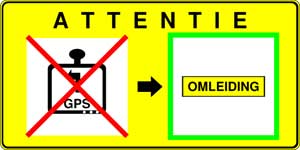Yesterday on telly (Nova) I saw a report about how Poles were getting on in Rotterdam. Once they showed the Polish food store (ethnic groups are often automatically associated with their food), I watched the rest. What I heard was well educated, normal looking Europeans who just happen to have crappy jobs that apparently pay less than minimum wage in 40% of cases and homes that are overpriced and crowded. As well, some 50% want to stay in the Netherlands because their chances are simply better. Some politicians says this will prepare them for the next wave of Eastern Europeans (Bulgarians and Romanians) who are due to arrive soon. These people are more often than not highly educated, speak several languages and do jobs the Dutch apparently have the luxury to refuse to do. They are not illiterate housewives or too old to integrate.
Then I found this recent article that reads “Poles speak English too well”, which is some weird complaint. On telly, they said that many Poles came to the Netherlands from England and Ireland, so it is logical that they speak some English. The article, however, basically points out that setting up Polish lessons for employers (known as reverse integration and highly criticised) is a waste of time if the Poles speak English. The people setting up these courses could have known this if they 1) bothered to get information from the Polish community like the telly did and 2) looked further in Europe than their own miniscule backyard.
And remember, when the Poles do stay they are obliged to learn Dutch anyways, so communication will be even easier! It seems the municipalities and the people setting up courses could use some serious cultural communication lessons themselves. Poles often speak Polish, some Russian and/or German, English and even other languages like French. Ah but learning Polish was a way to make money which backfired big time hence the complaint.
(Link: leeuwardercourant.nl)

 The Tokkie family is suing dictionary makers Van Dale—the Dutch Duden / Larousse / Webster / what-have-you—for 50,000 euro over the inclusion of their family name with the definition “anti-social behaviour.” The Tokkies are also suing weekly Revu
The Tokkie family is suing dictionary makers Van Dale—the Dutch Duden / Larousse / Webster / what-have-you—for 50,000 euro over the inclusion of their family name with the definition “anti-social behaviour.” The Tokkies are also suing weekly Revu 
 Civil servants who felt that the term “maiden name” might not be appreciated by the participants in an all-male wedding asked the Nederlandse Taalunie (Dutch Language Union) to come up with a new phrase. The Union is not in the habit of creating words but
Civil servants who felt that the term “maiden name” might not be appreciated by the participants in an all-male wedding asked the Nederlandse Taalunie (Dutch Language Union) to come up with a new phrase. The Union is not in the habit of creating words but  A Flemish study which showed that the Dutch talk faster than their Southern neighbours was shot down rapidly by Dutch experts when it was first published in 2004. But four years later linguist Hugo Quené from the University of Utrecht has proved his Flemish colleagues right. Quené used new methods to pick apart the 38-hour speech corpus and used a recently developed statistical method, multi-level analysis. As it turns out long “phrases” (bits of speech separated by pauses) take relatively less time to pronounce than short ones. Even so, the Dutch tend to use shorter phrases than the Flemish. Also when phrases of the same length were compared, the Dutch proved to be the fast talkers.
A Flemish study which showed that the Dutch talk faster than their Southern neighbours was shot down rapidly by Dutch experts when it was first published in 2004. But four years later linguist Hugo Quené from the University of Utrecht has proved his Flemish colleagues right. Quené used new methods to pick apart the 38-hour speech corpus and used a recently developed statistical method, multi-level analysis. As it turns out long “phrases” (bits of speech separated by pauses) take relatively less time to pronounce than short ones. Even so, the Dutch tend to use shorter phrases than the Flemish. Also when phrases of the same length were compared, the Dutch proved to be the fast talkers.